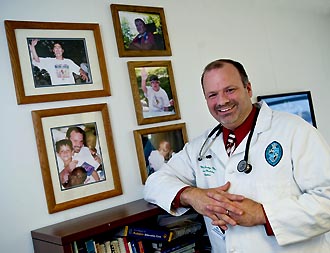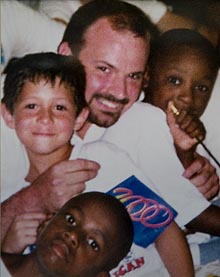Doctor Heads to Summer Camp
Dr. Michael Landry is going to camp again this summer. This June marks his 25th year attending Camp Pelican a classic week-long summer camp for kids, but one with an important difference. Located in Leesville in west-central Louisiana, Camp Pelican is for children ages 4 through 15 who have pulmonary diseases such as asthma or cystic fibrosis.

Dr. Michael Landry is going for his 25th year to Camp Pelican, a program for children who have pulmonary diseases such as asthma or cystic fibrosis. (Photo by Paula Burch-Celentano)
Landry, an associate professor of internal medicine and pediatrics in the Tulane School of Medicine, first served as a counselor in camps for children with disabilities in 1985 while he was a student at Jesuit High School in New Orleans, fulfilling the school's community service requirement.
"Camp Pelican first started in 1977," he says. "It was conceived by a group of respiratory therapists who would see kids with cystic fibrosis in the hospital and felt that they needed more."
They believed it would be beneficial to have camp where the young patients could be around children with similar problems. "That way, all the campers could be the same," says Landry.
Landry continued to volunteer at Camp Pelican each summer even while he was attending the Tulane School of Medicine, working it into his medical school rotations and residency program. And as soon as he graduated in 1998, he assumed the posts of camp medical director and doctor. In addition to his post on the Tulane faculty, Landry is chief of general internal medicine for the Southeast Louisiana Veterans Health Care System.
Camp Pelican offers fun experiences that get the children moving, according to Landry. "A typical day up in the morning at 7 for personal hygiene, then we go to the flag-raising," he says. "Each morning has three activity periods of 30 to 45 minutes we have swimming, arts and crafts, sporting events and education."

Shown with a group of the young participants at Camp Pelican, Dr. Michael Landry enjoys helping out at the week-long session each summer in Leesville, La.
Sports naturally play a big role. The children boat on Lake Vernon, and there is archery, putt-putt golf, BB guns and cabbage ball. Lunch is at midday, and then the kids have a rest period. In the afternoon they have another swim, a snack period and a longer educational session followed by a nighttime activity.
Education is really the key purpose of the camp, says Landry. "We teach the kids all about their bodies and their disease processes and how to live with it. If you're a five-year-old with asthma, how do you ask someone not to smoke around you? Being in a group setting with other kids who have similar problems empowers them to speak up."
Some of the campers have very specialized needs. "We're one of a handful of camps in the country that will take ventilator-dependent kids without their normal caregivers their parents or their specialized nurses at home." Some of these children have been able to enjoy splashing in a pool for the first time, thanks to the ingenuity of the Camp Pelican medical staff.
Camp Pelican is co-sponsored by the Louisiana Pulmonary Disease Camp Inc. and the Louisiana Lions Camp.
The Louisiana Lions own the campground and since 1988 have underwritten the expenses of each camper. And the camp owes much to the dedication of its volunteer staff, many of whom have been involved for years, says Landry.
"We've had campers who went through and came back as nurses, respiratory therapists and physicians. Camp molded them into the health professionals that they are today."
